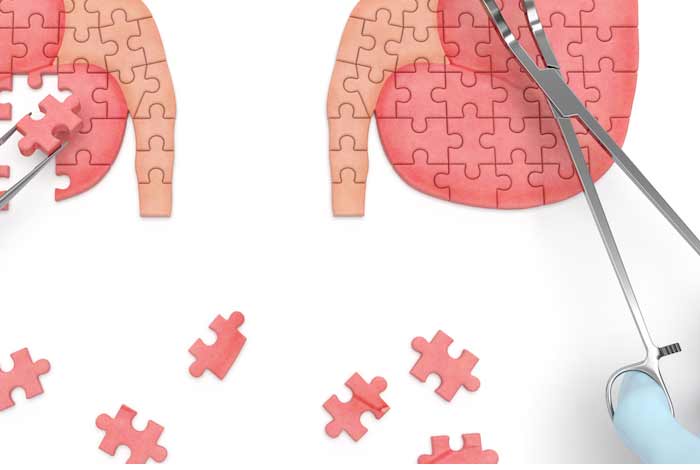What is end-stage kidney disease?
As the name suggests end-stage kidney disease or ESKD is the most advanced form or stage of long-term kidney disease which eventually results in kidney failure over time.
From 5 stages of kidney diseases, ESKD is the final one.
Like every other body organ, the kidneys also have their essential function i.e. to filter out the waste material. When the kidney loses its functioning, waste products build up inside the body which can be life-threatening. Patients with ESKD will need a kidney transplant or dialysis to ensure their survival.
Symptoms of ESKD
When your kidneys are not working properly and unable to filter unwanted waste, it may lead to the following symptoms of ESKD:
- headaches
- reduced appetite
- tiredness
- unexplained weight loss
- shortness of breath
- chest pain
- muscle cramps
- little or no urination
- skin discoloration
- tingling in feet or hands
Causes of Kidney Failure
Chronic or long-term kidney disease can lead to ESKD, but your kidneys may stop working without any notice. A sudden kidney failure is known as acute kidney injury or acute renal failure. The causes behind acute renal failure and ESKD are mentioned below:
Chronic causes of ESKD
According to the American Kidney Find, both diabetes and high blood pressure are responsible for chronic conditions such as ESKD. Other conditions that can lead to end-stage kidney disease include:
- nephrotic syndrome
- urinary tract related problems
- lupus along with other autoimmune problems
- genetic conditions
Acute renal failure
It is a more complicated state where your kidneys suddenly stop to work. Causes may include:
- poisoning
- a heart attack
- urinary tract obstruction
- substance misuse
- severe dehydration
- severe blood infection
Risk factors
About ten to sixteen percent of adults are affected by chronic kidney disease worldwide. It is the most advanced stage and can develop over years due to many lifestyle choices and health condition.
Several factors increase the risk of ESKD include:
- being overweight
- high blood pressure
- diabetes
- smoking
- older age
Complications
Kidney losing its functioning will affect the whole body and other organs. These complications can also be life-threatening . ESKD complications include:
- internal bleeding
- anemia
- sexual dysfunction
- problems during pregnancy
- liver damage
- weakened immune system
- nerve damage to arms or legs
- fluid retention
- bone fractures
- heart problems
Diagnosis
Doctors do some urine or blood tests to diagnose the issues. These tests may vary according to your health condition and feasibility:
- Urinalysis: Check the presence of blood and protein in the urine.
- Glomerular filtration rate (GFR): Measures kidney’s ability to filter the waste out of blood.
- Blood urea nitrogen test: Measures the amount of nitrogen in the blood.
- Serum creatinine test: Check the blood and the amount of waste buildup called creatine.
Treatment
Generally, doctors advise for a renal replacement therapy to treat ESKD. This therapy includes both dialysis and transplant for the treatment.
According to the stats, about 1.4 million people were reported to receive renal replacement therapy all around the globe in the year 2013.
Dialysis is categorized as hemodialysis and peritoneal dialysis depending according to the process and ways of treatment according to every patient’s need.
On the other side, in a kidney transplant, a special surgery is taken out to replace the damaged kidney with a donated one. Patients are advised to follow a specific diet and meal plan to ensure the success of treatment. This diet may involve:
- eating sufficient calories
- limiting fluid intake
- avoiding foods high in protein
- controlling electrolyte intake
Prevention
Tiny lifestyle changes may help you to slow down the damage and support treatment. Some of the preventions include:
- drinking less or no alcohol
- stop smoking
- managing blood pressure
- exercising regularly
- losing weight
- healthy eating
- taking prescribed medications correctly
Outlook
People with symptoms of ESKD or chronic kidney disease should consult their doctor. Right treatment on time may help improve the outlook and condition of the patient. Kidney dialysis or transplant could help to lower the risk and make it situations less life-threatening.
